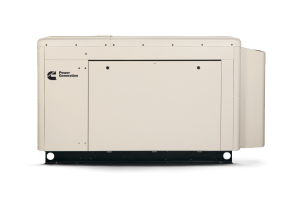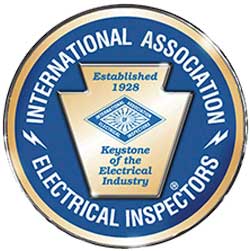Commercial Generators
 A commercial generator is an important part of the planning process for businesses of every size and can greatly reduce business disruption when power is interrupted. In certain places of Pennsylvania, New Jersey and Delaware – power outages are a normal occurrence. More importantly, as our regions power grids grow, their infrastructure are unable to handle the demand. Freak storms and changing weather patterns add more uncertainly to continuous power. For business that depend on a continuous stream of power, a generator can solve that issue. Commercial generators automatically switch on when the utility goes down and can run for days and weeks. If your business is power dependent – restaurants, banquet halls, medical facility, food processing, data centers, etc. please contact us for a free estimate on a commercial generator.
A commercial generator is an important part of the planning process for businesses of every size and can greatly reduce business disruption when power is interrupted. In certain places of Pennsylvania, New Jersey and Delaware – power outages are a normal occurrence. More importantly, as our regions power grids grow, their infrastructure are unable to handle the demand. Freak storms and changing weather patterns add more uncertainly to continuous power. For business that depend on a continuous stream of power, a generator can solve that issue. Commercial generators automatically switch on when the utility goes down and can run for days and weeks. If your business is power dependent – restaurants, banquet halls, medical facility, food processing, data centers, etc. please contact us for a free estimate on a commercial generator.
Generator Dealer
4B Systems sells, installs and maintains your generator. We have installed 100’s of commercial generators in the region. We are certified work on commercial properties and have specialists to deal with permitting, plumbing and every aspect of your installation. We will also help you determine your exact electrical specification needs to insure proper sizing of your commercial generator. We work with generators from 20kW to 150kW and larger for industrial purposes.
Choosing a generator and related supplies
Before purchasing an electrical power generator, consider what electrical equipment that must be operable when normal power is interrupted. Other considerations include:
- How often does the business lose power and for how long?
- What are the most likely sources of power outages?
- What are the potential losses that can occur from a short and long term outage?
A standby generator, in contrast, is a back-up electrical system that is permanently installed and may operate automatically through the use of a transfer switch, which senses a power loss, commands the generator to start, and then transfers the selected electrical load to the generator.
Generator Facts
- Permanent generators are wired into your building’s electrical system through a transfer switch.
- When ATS switches sense a power outage they isolate your “emergency” electrical wiring, providing power to the selected equipment from the normal power source, then start to transfer the “emergency” load to the generator.
- When the power is restored, the switch also will connect “emergency” circuits back to the utility lines and turn off the generator.
- Permanent generator should be compatible with the fuels available in your area — most models operate with natural gas, propane, or on a bi-fuel basis.
Purchase and Installation
4B Systems will help sizing, purchasing, permitting and installing your standby generators. We are local experts and have electric and plumbing specialists that have installed hundreds of standby emergency generators.
- We will help size your commercial generator based on maximum usage.
- We will provide a detailed quote including material costs, generator cost and installation.
- We will provide proof of insurance, for both the manufacturer of the generator and the contractor, as well as a written warranty from the manufacturer and a guarantee from the contractor.
- We will abide by local codes that require permits and inspections of plans and installation practices.
- We will walk you through the operations and maintenance processes of the generator and offer annual maintenance programs.
Testing, maintenance and operations
Most emergency generator failures are typically caused by poor testing and maintenance practices. 4B Systems provides annual maintenance and monitoring programs.
- Regularly scheduled testing and maintenance of emergency generator equipment is essential to ensure peak performance when you need it most.
- Generators — require the use of fuel. Diesel fuel is more prone to oxidation than gasoline, and should never be stored for longer than 12 months.
- Fuel filters should be maintained in accordance with the equipment manufacturers’ recommendations to prevent this problem.
- Proper coolant level is critical to the operation of a generator. Check coolant levels prior to start up and monthly for maintenance.
- Like any engine, a generator uses oil. Use the right type of oil, maintain the proper oil level and change the oil when it appears dirty.
- Check that all air vents or louvers are in good condition, free of dirt and debris, and, if required, that they move freely during operation.
- Visually inspect the condition of all hoses, gaskets and gauges to ensure these are free of cracks and operational without leaks.
- At start up, check that operating pressures and temperatures are stable and within the manufacturers design parameters.
- Also, when the engine is running, check for unusual engine noise and knocking. If there are any unusual sounds.
- Maintain a log of all test operations and record all readings.
- In the event of an impending storm that could result in power outages, test the generator system and top off all liquids at the conclusion of the test.
These are just a few of the issues for you to be aware of when deciding on purchasing a standby emergency generator for you commercial business. We are standing by to answer any questions you have regarding emergency back up generators. Please contact us for info or a free quote.
 A commercial generator is an important part of the planning process for businesses of every size and can greatly reduce business disruption when power is interrupted. In certain places of Pennsylvania, New Jersey and Delaware – power outages are a normal occurrence. More importantly, as our regions power grids grow, their infrastructure are unable to handle the demand. Freak storms and changing weather patterns add more uncertainly to continuous power. For business that depend on a continuous stream of power, a generator can solve that issue. Commercial generators automatically switch on when the utility goes down and can run for days and weeks. If your business is power dependent – restaurants, banquet halls, medical facility, food processing, data centers, etc. please contact us for a free estimate on a commercial generator.
A commercial generator is an important part of the planning process for businesses of every size and can greatly reduce business disruption when power is interrupted. In certain places of Pennsylvania, New Jersey and Delaware – power outages are a normal occurrence. More importantly, as our regions power grids grow, their infrastructure are unable to handle the demand. Freak storms and changing weather patterns add more uncertainly to continuous power. For business that depend on a continuous stream of power, a generator can solve that issue. Commercial generators automatically switch on when the utility goes down and can run for days and weeks. If your business is power dependent – restaurants, banquet halls, medical facility, food processing, data centers, etc. please contact us for a free estimate on a commercial generator.


